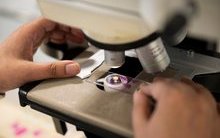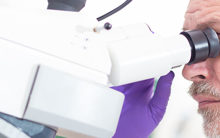When a child dies families desperately need to know what happened. To understand why an infant died, it is vital agencies work together, share information and keep families included at every stage. Sudden unexpected death in infancy and childhood launched today (30 November), is a multi-agency protocol for the handling of sudden infant death.
The guidelines have been published by a multi-agency working group convened by The Royal College of Pathologists (RCPath) and The Royal College of Paediatrics and Child Health. They aim to be sensitive to the needs of grief-stricken parents while also enabling an explanation to be found. They also make recommendations to each profession and outline best practice for each part of the investigation process.
The original guidelines published in 2004 followed high profile cases of miscarriages of justice involving the prosecution of mothers for causing the deaths of their babies. These events raised serious concerns about the role of the expert witness in court, issues about standards of proof, the quality of evidence and about the procedures adopted for the investigation of sudden unexpected deaths of infants.
Baroness Helena Kennedy QC and Chair of the Working Group said:
“It is important to remember that, in the majority of cases where a child dies unexpectedly and suddenly, nothing untoward has taken place. It is only in a small number of cases where something unlawful has occurred. Professionals investigating the sudden and unexpected death of a child have to strike a balance between maintaining justice for parents while ensuring the protection of the youngest amongst us who have no voice.
This report takes a fresh look at how agencies can investigate unexpected deaths in infants with thoroughness, care, compassion and to the highest possible standards.”
Francine Bates, Chief Executive, The Lullaby Trust said:
“We can never take away the tragedy of losing a baby suddenly and unexpectedly but we can ensure that families get the support they need during this terrible time in their lives.
Every death must be properly investigated and parents are the first to ask why their baby died. Many professionals from different agencies become involved when an apparently healthy baby dies. It is therefore crucial that we have sensitive guidelines in place setting out how we can all work together while at the same time caring for the bereaved family.”
Professor Neil Sebire RCPath expert lead for paediatric pathology said:
“Understanding why a child has died is crucial for identifying the cause of death and determining whether it could have been prevented. Families want to know what happened, and why it occurred, both to help deal with the trauma of such a devastating loss but also to help alleviate anxieties about future pregnancies or other children. Unfortunately, in many cases, the death remains unexplained despite investigation. We need to continue research into understanding why and how apparently healthy children die suddenly and unexpectedly.”
Dr Geoff DeBelle, Officer for Child Protection, Royal College of Paediatrics and Child Health:
“Every child's death is a tragedy. Many of these deaths are from natural causes such as extreme premature birth and its complications, congenital anomalies, infection and malignancy. Others relate to road traffic injuries. Only around 1% of such deaths can be directly attributed to abuse and neglect.
It is incumbent on dedicated professionals to investigate all deaths in childhood to assist the coroner, to determine whether there is potential to prevent further deaths and to ensure that the parents and surviving siblings have appropriate explanation, advice and bereavement counselling. The new edition of the guidelines provide the most up-to-date and evidence-based guidance for the multi-professional investigation of all deaths in childhood. It will ensure that such investigations are undertaken in a uniform, thorough and sensitive manner across the UK.”
This 2016 edition of the guidelines have been extensively reviewed and updated by an expert working group from the healthcare, charity and justice sectors and cover multi-agency planning, supporting families, assessment of the environment and circumstances of the death, case discussion, the post-mortem and the inquest and role of the coroner. They are based on the best current international research.
The working group also recognises that further work is needed in the area of investigating sudden death in infancy and childhood and hope that this document will stimulate discussion and further research.
Dr Nisar A Mir, Chair National Network of Child Death Overview Panels (NNCDOP) & Fellow Royal College of Paediatrics & Child Health commented:
“Although there have been significant reductions in child deaths in the past three decades, too many children are still dying unnecessarily; England, Wales and Scotland saw 4760 infants, children and adolescents die before their 18th birthday in 2014.
Many will remember the first edition of Sudden unexpected death in infancy and childhood, as Baroness Kennedy’s doctrine. It laid the foundation for the development of local policies and procedures on investigating sudden unexpected child deaths across the country; the new edition incorporates considerable evidence based changes.”
Dr Peter Sidebotham, Associate Professor of Child Health, Warwick Medical School:
“In my work with bereaved families, I have come across terrible situations where parents have been kept in the dark or made to feel like criminals. I have also experienced some great examples of how families have been supported through the days and weeks following their child’s death and how police and health professionals have worked together in a sensitive, thorough, and caring manner. Parents often tell me that what they want, above anything else, is to understand why their baby died, but also their hopes that by investigating their child’s death thoroughly, we can work to prevent other families having to go through a similar experience.”
Chair of the National Police Chiefs’ Council Child Death Investigation Working Group, Detective Chief Superintendent Geoff Wessell said: “It is our duty as police officers to investigate any death of an infant fully with the utmost sensitivity. These guidelines have been developed with relevant experts to advise all agencies involved on the best practice for investigating these tragic cases in a manner that is thorough and uses co-ordinated information sharing between partners.”
Sudden unexpected death in infancy and childhood (2nd edition) - Multi-agency guidelines for care and investigation encompasses the statutory duties of individual professionals and agencies to investigate all sudden and unexpected deaths in infancy and childhood according to Working Together to Safeguard Children: A Guide to Inter-agency Working to Safeguard and Promote the Welfare of Children (Department for Education, 2015) and best evidence. Such guidance is based around regulatory structures in England, but it is intended that the principles of the guidelines can also be applied in areas in which other systems are in place.
The Royal College of Paediatrics and Child Health (RCPCH): contributes to setting and maintaining standards for the education and training of doctors working in paediatrics and child health in the UK and internationally. The RCPCH influences and shapes health policy and health services for infants, children and young people in the UK, advocates on their behalf, and strengthens the science and research base of paediatrics and child health. To date, the RCPCH has over 17,000 members and fellows.
The Lullaby Trust provides specialist support for bereaved families, promotes expert advice on safer baby sleep and raises awareness of Sudden Infant Death Syndrome (SIDS). Working with the NHS we run a national health-visitor led service for bereaved parents, Care of Next Infant (CONI) programme, which supports families before and after the birth of their new baby.
We are committed to supporting research to understand why babies die suddenly and unexpectedly and to find out more about how to reduce the risk of these tragic deaths.
The Lullaby Trust also runs an information line for parents and professionals (0808 802 6869) and a dedicated line for bereaved families (0808 802 6868). Both are free to call from landlines and mobiles.
In 2008, local Child Death Overview Panels (CDOPs) were statutorily established in England, with the responsibility of reviewing the deaths of all children under 18, their main function is to prevent future child deaths. Currently there are 92 such panels and during 2015 the panels reviewed 3665 child deaths. One in five deaths is avoidable and other modifiable factors are present in one third of the cases; multiple risk factors were present in 60% of children where the death was sudden and unexpected and occurred and/or was associated with abuse or neglect.







